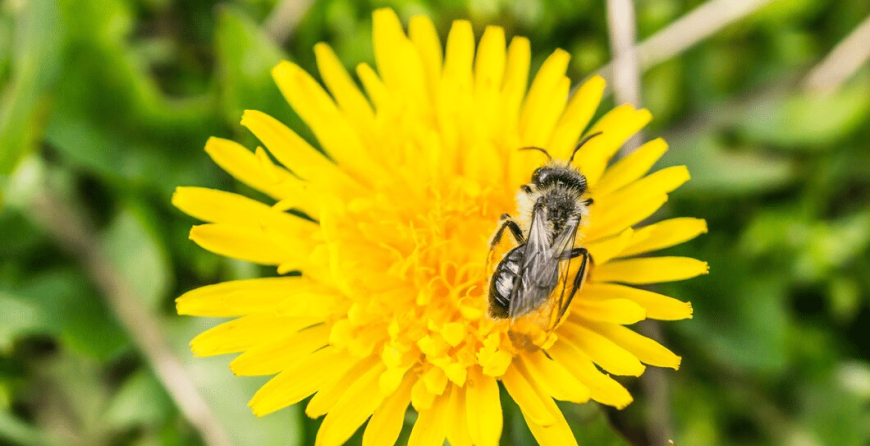
How to Safeguard Bee Populations and Your Gardens Future – Christie Erickson
Image: Freepik
How to Safeguard Bee Populations and Your Garden’s Future
Bees, the unsung heroes of our ecosystems, play a crucial role in pollination, supporting the growth of countless plant species and ensuring the production of fruits and vegetables we rely on. To safeguard these vital pollinators and preserve the health of our environment, we must take proactive measures. Here are practical steps you can take to protect bee populations and foster a thriving garden ecosystem.
The Importance of Preserving Bee Populations
Bees play a crucial role as pollinators, responsible for one-third of global crop pollination. Their contribution enhances agricultural productivity, food security, and biodiversity conservation. Declines in bee populations not only impact crop yields but also threaten the balance of ecosystems, emphasizing the importance of conserving bee populations for sustaining food systems and natural environments.
Minimizing or Eliminating Pesticide Use in Your Garden
To safeguard bees and other beneficial insects, reduce pesticide use in your garden by opting for natural alternatives or integrated pest management methods. Companion planting with flowers like geraniums or African marigolds can deter pests like Japanese beetles without harming pollinators. Pesticides pose direct threats to bees, contaminating their food sources and compromising their immune systems, underscoring the importance of minimizing their use to create a safer habitat for bees in your garden.
Starting a Business in Beekeeping
Starting a beekeeping business offers both conservation benefits and entrepreneurial opportunities. Through beekeeping, individuals can provide pollination services to farmers, harvest bee products for sale, and contribute to sustainable agriculture. Furthermore, beekeeping serves as an educational platform, allowing individuals to learn about bees’ significance to ecosystems while promoting environmental stewardship.
Planting a Variety of Flowers
Create a diverse floral habitat in your garden by planting flowers that bloom at various times of the year, ensuring bees have a continuous supply of nectar and pollen. Incorporate both native and non-native plants with diverse shapes, colors, and fragrances to attract a wide range of bee species. By providing a varied and attractive floral haven, you not only support bee populations but also enhance the beauty and biodiversity of your garden.
Preserving Natural Bee Habitats
Enhance bee populations by creating or conserving natural habitats in your garden with native plants, nesting sites, and water sources. Planting native wildflowers, shrubs, and trees offers bees suitable food sources and nesting materials. Preserve features like dead wood, leaf litter, and brush piles to support solitary bees and other native pollinators, ultimately bolstering bee resilience and ecosystem health.
Embracing Wild Spaces
Promote bee habitat diversity by leaving areas of your garden wild, offering bees and wildlife shelter, nesting sites, and foraging opportunities. Encourage the growth of native grasses and wildflowers to create varied habitats for bees. Designate a “wildlife corner” in your garden where plants can flourish undisturbed, fostering biodiversity and providing crucial resources for bee thriving.
Supporting Local Beekeepers
Purchase locally produced honey and other bee products to support beekeepers in your area. By buying locally, you not only contribute to the livelihoods of beekeepers but also promote sustainable beekeeping practices. Local beekeepers play a vital role in bee conservation efforts, providing essential pollination services and maintaining healthy bee populations. By supporting local beekeepers, you help ensure the availability of fresh, high-quality honey and support the local economy.
Buying Organic
Choose organic produce to minimize pesticide exposure for bees and support environmentally friendly farming practices. Look for organic certification labels when purchasing fruits, vegetables, and other food items to prioritize soil health, biodiversity, and sustainability. Organic farming methods, such as natural pest control and soil conservation, foster healthier ecosystems for bees and other pollinators.
Advocating for Bee-Friendly Policies
Advocate for bee protection by supporting policies and initiatives that prioritize bee health and biodiversity conservation. Get involved in local advocacy efforts, raise awareness about bee conservation, and engage with elected representatives and community organizations dedicated to environmental conservation. By advocating for bee-friendly policies, you contribute to meaningful change and ensure a brighter future for bees and the ecosystems they support.
As stewards of the environment, we have a responsibility to protect and nurture bee populations for future generations. By implementing these strategies in our gardens and communities, we can create thriving habitats for bees, promote biodiversity, and contribute to the well-being of our planet. Together, let’s cultivate a world where bees can thrive and continue their vital role in sustaining life on Earth.
Enhance the sustainability of your garden with eco-friendly and durable plant labels from MCG BioMarkers.

